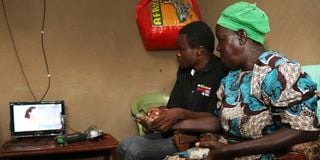Buy now, pay later juggernaut raises stakes

M-Kopa started in 2011 as a retailer of solar-powered electrical equipment. It has partnered with companies like Safaricom’s to offer internet-enabled handsets under ‘lipa mdogo mdogo’ concept.
First, it was the digital lenders pouring into Kenya’s financial landscape now, buy now pay later (BNPL) companies are the new kids on the block sweeping away the young consumer keen on acquiring products they cannot afford.
Kenya’s BNPL is picking up led by companies like Aspira, Lipa Later, Miti, Flexpay Technologies, Julla, Pawame and MKopa.
The companies are mostly offering flexible payment terms to purchase mobile phones, household appliances, electronics, IT gadgets and even holidays in partnership with retailers like Naivas, Safaricom, Samsung, LG and Hotpoint.
The model in Kenya is expected to grow by 107.8 per cent on annual basis to reach Sh62.6 billion ($521.8 million) in 2022 according to to report by ResearchAndMarkets.com.
The industry is not necessarily new in Kenya, the older generation remembers hire purchase companies like ART, Kenya Credit Traders and Amedo franchise for Singer Sewing machines.
The ‘kwa malipo ya rahisi’ (easy to pay) concept helped many Kenyans who could not afford radio and television sets in the 1990’s to acquire them and pay for them in instalments.
High prices
Then as is now, they faced the problem of high prices, sometimes twice as much as the cost of the products. Also, they could lose the assets on default even after making innumerable payments.
Today, BNPL companies are a multi-billion industry leveraging clean technology to access start-up funding and getting into partnerships with retailers to help them move products at a time Kenyan consumers are up to the neck in inflation amid stagnant wages.
Off-grid solar power start-ups are pouring into Kenya's rural areas offering pay-as-you-go kits in a race to claim customers who lack reliable access to electricity.
PAYGO asset financing companies like M-Kopa, Pawame, Solar Panda, D.Light, Greenlight Planet, Aspira, Bboxx, Azuri, Biolite, Daima Energy, Delta Energy Systems Ltd, Kensen, Mobisol, PowerGen, Solargen, Sunking, Suntech, ZilanSolar, Thrivesolar, Ofgen, Strauss Energy, and ORB Energy are all competing in this space.
Green energy products
M-Kopa is a market leader in this space that has seen an expansion after raising nearly Sh22.8 billion ($190 million) from investors over the years to expand its asset finance business that allows customers to pay for green energy products in instalments.
M-Kopa started in 2011 as a retailer of solar-powered electrical equipment. It has also partnered with companies like Safaricom’s to offer Internet-enabled handsets under ‘lipa mdogo mdogo’ concept.
It has now partnered with electric motorcycle companies that are leveraging partnerships with asset finance lenders to drive sales in Kenya targeting boda boda riders.
Swedish-Kenyan technology company Roam has partnered with M-Kopa to deliver a fleet of motorcycles by the end of 2022 in time for mass deployment in early 2023.
ARC Ride Kenya which launched a plant in Kenya producing 500 two and three-wheeled electric scooters and bikes each month also partnered with MKopa and Watu Credit to be able to offer the product through flexible financing terms.
Manufacturers are turning to asset finance companies that offer flexible ‘pay as you go' terms that allow riders to acquire the units and pay as they earn an income.
Roam said that by combining the power of digital micropayments with the Internet-of-Things (IoT) technology, M-KOPA enables underbanked customers to access a broad range of products and services without collateral.
“M-Kopa will aid in the deployment of the motorcycles through its innovative ‘Pay-As-You-Go’ model, which allows customers instant access to products while building ownership over time through flexible micro-payments,” said Mikael Gånge, Co-Founder and Chief Commercial Officer, Roam.
The rise of the by now pay later company has been propelled by technology that allows the firms to assess a borrower instantly using data points akin to digital mobile loans.
Through the ‘Lipa Mdogo Mdogo’ for instance, Safaricom identifies eligible customers through their use of Safaricom services for at least one year, using Mpesa, voice and SMS services.
Julla App CEO Yele Oyekola says the company uses its formula for calculating risk and approving loans, which involves data science, artificial intelligence (AI), and machine learning technologies.
The companies are however charging an arm and a leg due to the high risk of defaults in the model.
Lipa Later charges nearly 50 per cent for a 12-month facility while Aspire charges 48 per cent plus an upfront fee for a similar product.
These high rates risks attracting regulators to this segment just like CBK went after digital loans accused of predatory lending, abuse of data, and poor consumer relations.
And just like digital loans, Banks are catching the whiff of this new industry threatening to eat their lunch.
Equity Bank partnered with Safaricom and fintech firm EDOMx to launch Faraja, slightly similar to the Lipa Later service currently in the market, only that this time, shoppers will walk away with the goods from a list of selected merchants without being required to pay upfront in installments.
The Central Bank of Kenya (CBK) however blocked the zero-interest credit service before it could take off.
The interest-free product was set to disrupt the mobile loans market allowing users to buy goods and services from as low as Sh20 to a maximum of Sh100,000 and pay the same amount without any extra fees witnessed on other credit products. Only the normal M-Pesa transaction charges will apply at the point of sale on the product to be bankrolled by Equity Bank.
These details had been revealed on Safaricom and EDOMx websites which had published the product terms and conditions and frequently asked questions but have now been pulled down from the companies' websites following the freeze.
The new credit service is likely to take on a raft of bank-backed micro-lending apps.
It also signals banking interest in the buy now pay later industry.





